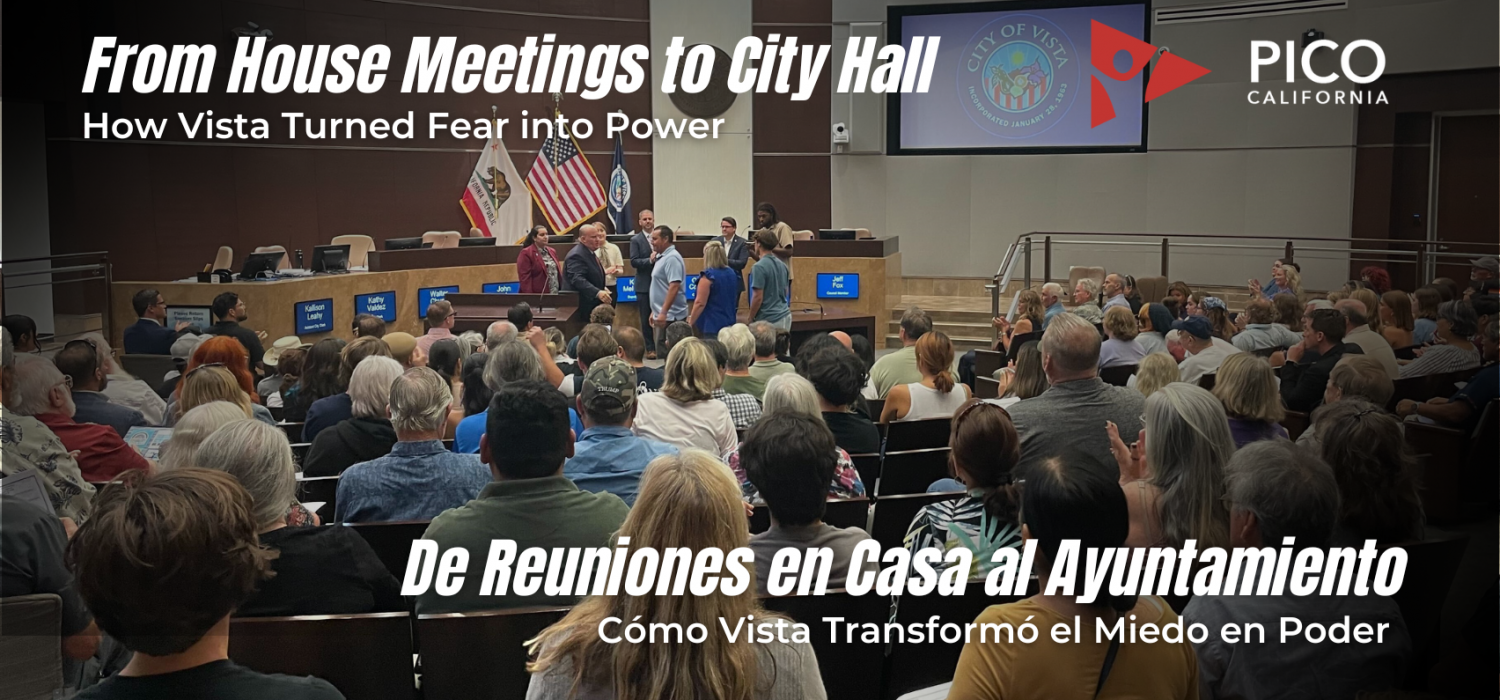How Vista Turned Fear into Power
En Español abajo
In Vista, California, fear had begun to spread. Immigration raids were separating families, neighbors avoided one another, and anxiety rippled through parish halls. But inside St. Francis of Assisi Catholic Church, parishioners began to gather; not to mourn what they were losing, but to listen to one another and act.
Led by the San Diego Organizing Project (SDOP), one of PICO California’s nine federations, and the clergy of St. Francis, those small meetings grew into a citywide movement. What began as quiet conversations in living rooms and pews became a collective act of courage that would change local policy and the civic imagination of a community.
In late September, after nearly five hours of heated public debate, the Vista City Council narrowly passed a due-process resolution protecting immigrant and Latino residents from unconstitutional enforcement actions. Despite strong opposition, including from the mayor, SDOP organizers and faith leaders from St. Francis mobilized more than 300 community members to fill the council chambers and make their voices heard.
This victory wasn’t the work of one person. It was the result of people power; of faith, organizing, and moral leadership united in action.
To understand how it happened, PICO California spoke with the leaders behind the movement: those who organized, preached, and stood with their neighbors through months of preparation and one long night of courage. Their reflections reveal what becomes possible when listening turns into trust, and trust turns into action for dignity and justice.
A City Learns to Move Together
Grounded by the courage of her constituents, Councilmember Corinna Contreras authored the resolution and stood firm through public attacks and misinformation campaigns.
“People were being taken from our streets without due process,” she said. “I couldn’t stand by. My duty as an elected official is to ensure that the Constitution is followed and that human dignity is upheld.”
Contreras, who represents Vista’s largely Latino District 1, worked closely with the San Diego Organizing Project (SDOP) and St. Francis of Assisi Catholic Church to bring the issue forward.
“This is not something I could have done alone,” she said. “Without an organized, faith-rooted community standing behind this, it wouldn’t have been possible.”
The resolution prohibits local law enforcement from cooperating with federal immigration enforcement in non-public spaces without a judicial warrant, restricts data-sharing with ICE, and mandates “Know Your Rights” education for residents.
“We can’t be afraid to do the right thing,” Contreras said. “We have to move forward with courage and we can do it together.”
From House Meetings to Collective Power
Months before the vote, SDOP lead organizer Teresa Pérez and parish leaders at St. Francis began organizing through deep listening and relationship-building.
“We started by listening,” Teresa said. “Immigration kept coming up, people were scared. So we built around that.”
Through nearly thirty house meetings and countless one-on-one conversations, trust grew. With the support of Pastor Rubén and clergy including Deacon Daniel Sanchez and Deacon José Luis Maldonado, the parish became the moral and relational center of the organizing effort.
“We went ministry by ministry, explaining what this resolution meant and how it could help protect their families,” Teresa recalled. “The Church gave people a place to gather, to ask questions and to find courage.”
Those house meetings did more than surface fears in the community, they built the connective tissue of a people learning to move as one. Over weeks of conversations in living rooms and parish halls, neighbors who once faced their anxieties in isolation began to see a shared story taking shape: what was happening on their streets was not inevitable, and they had a moral and civic path to change it.
Each meeting deepened understanding of the issue, of their rights, and of one another. People discovered where power lived in their city, what steps they could take together, and, most importantly, that their neighbors would be standing beside them when it mattered. The process turned fear into readiness, and readiness into resolve.
So when the night of the council vote arrived, that quiet web of relationships held. Over 300 residents filled the chambers and overflowed into hallways and courtyards. It was families, elders, and youth standing shoulder to shoulder, confident that they belonged and that they would not stand alone.
“Many told me later they were afraid,” Teresa said. “But they stayed. And when the vote passed, they said, we saw the power of the people.”
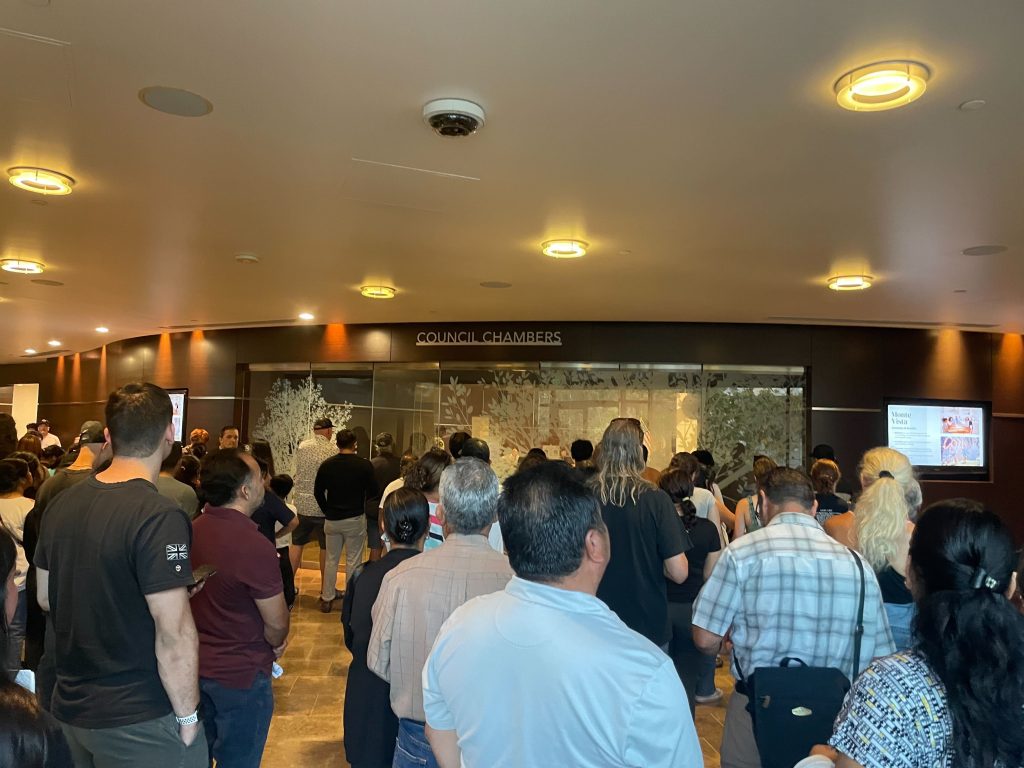
Faith Leaders on the Frontlines
For Deacon José Luis Maldonado, the experience was both civic and spiritual.
“As a deacon, one of my priorities is social justice,” he said. “I felt it was my obligation, not just as clergy, but as a resident, to stand with my community.”
He described the night as one of tension, transformation, and grace.
“At first, it was painful to hear so much opposition,” he remembered. “But as people began to share their stories, hearts started to change. By the end, when the vote passed, there was joy, tears, hugs, relief. It showed that faith and participation can move mountains.”
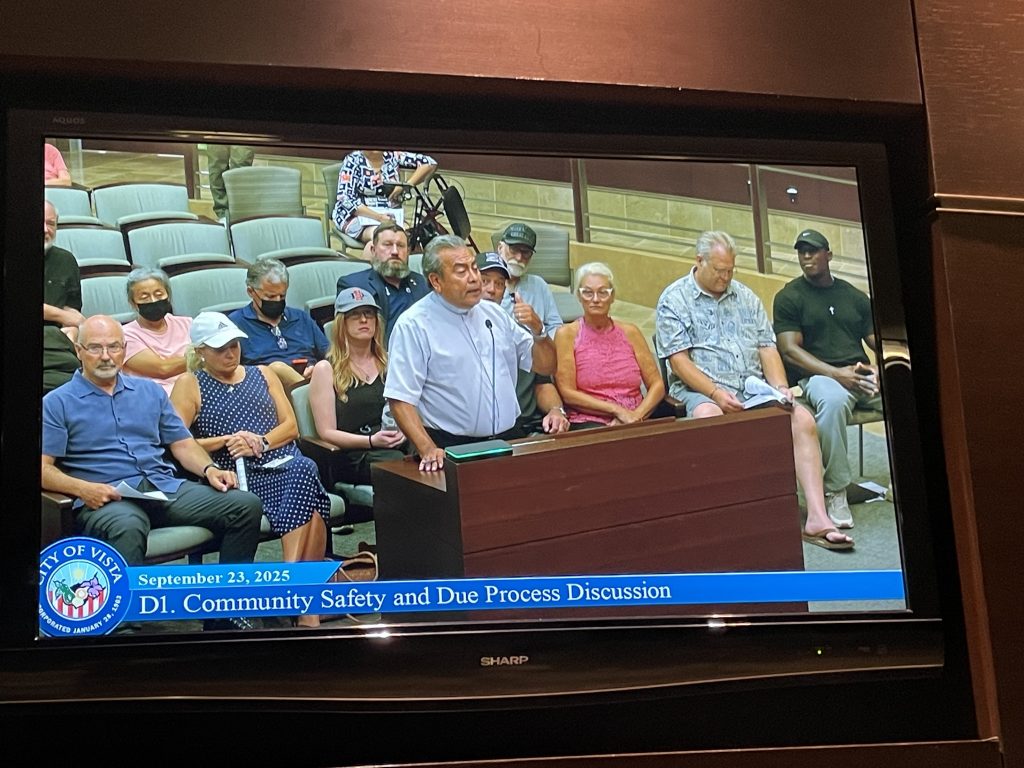
Organizing from the Ground Up
Among the many new leaders who helped make that turnout possible was Vanessa, a volunteer with SDOP and member of the Social Justice Ministry at St. Francis. Inspired by her mother’s involvement in church organizing, Vanessa helped spread the word, hold listening sessions, and support parishioners who were nervous about attending.
“When we started doing the listening sessions, people shared their fears,” she said. “We told them, we might not be able to change what’s happening nationally, but we can do something here, locally, together.”
Vanessa recalled how Pastor Rubén gave permission to announce the meeting at Spanish-language Masses, encouraging thousands of parish families to learn, ask questions, and take part.
“The Father always supports the Latino community,” Vanessa said. “People felt safer knowing the Church stood with them.”
Many who attended had never been to City Hall before. Vanessa helped reassure them that they belonged there.
“Some were afraid,” she said. “They’d ask, ‘Can I even go if I’m not a citizen?’ And I’d tell them, ‘Yes, you live here, this is your community, you have a right to be present.’”
Seeing hundreds of families come together was a turning point for her.
“When I saw the crowd, people standing, no chairs left, I said to myself, sí se puede. While we’re together, we’re strong.”
A Testament to Community Leadership
Also present that night was Luz, a retired government employee and SDOP board member who has long been part of St. Francis’ Social Justice Ministry.
“When we put the call out, we never know who’s going to come,” Luz said. “But when it’s important, people show up and that night they did. It gives me hope.”
She recalled sitting inside the council chamber beside residents who opposed the resolution. After she spoke, they grew quiet.
“They didn’t know me, they just had an image of who they thought we were,” she said. “Once they heard my story, it changed the atmosphere. That’s what happens when we listen to one another.”
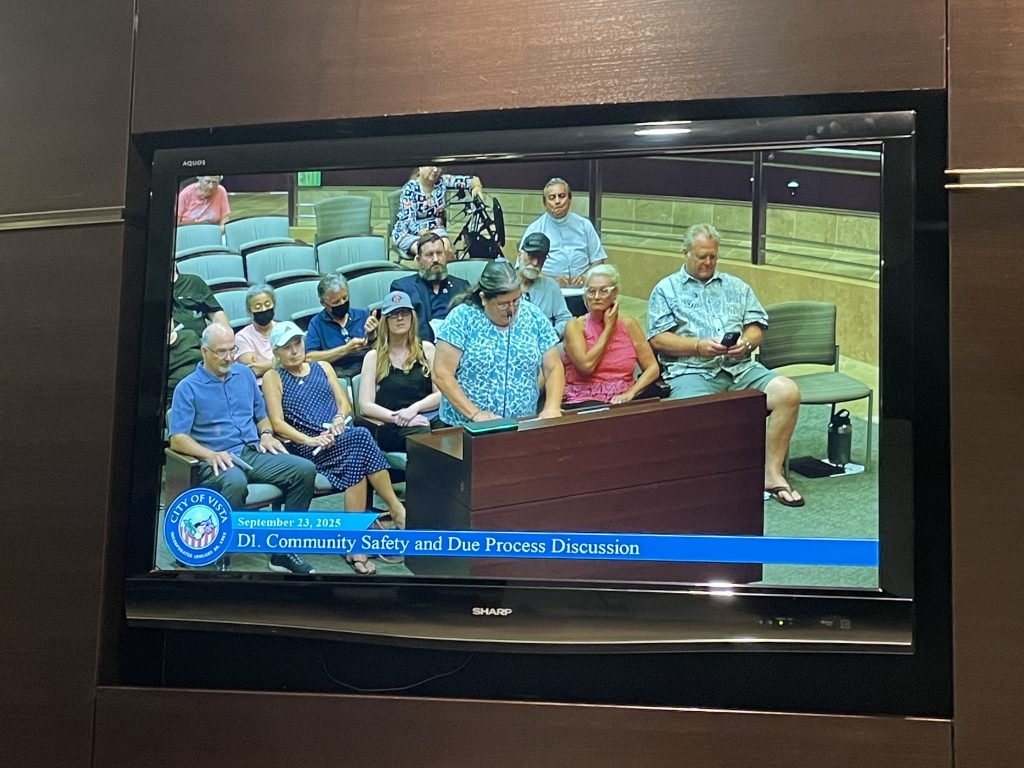
The Power of People and Hope
When the vote finally passed, shortly after one in the morning, the council chambers erupted in celebration. Families embraced. Children who had fallen asleep on their parents’ shoulders woke to applause and tears.
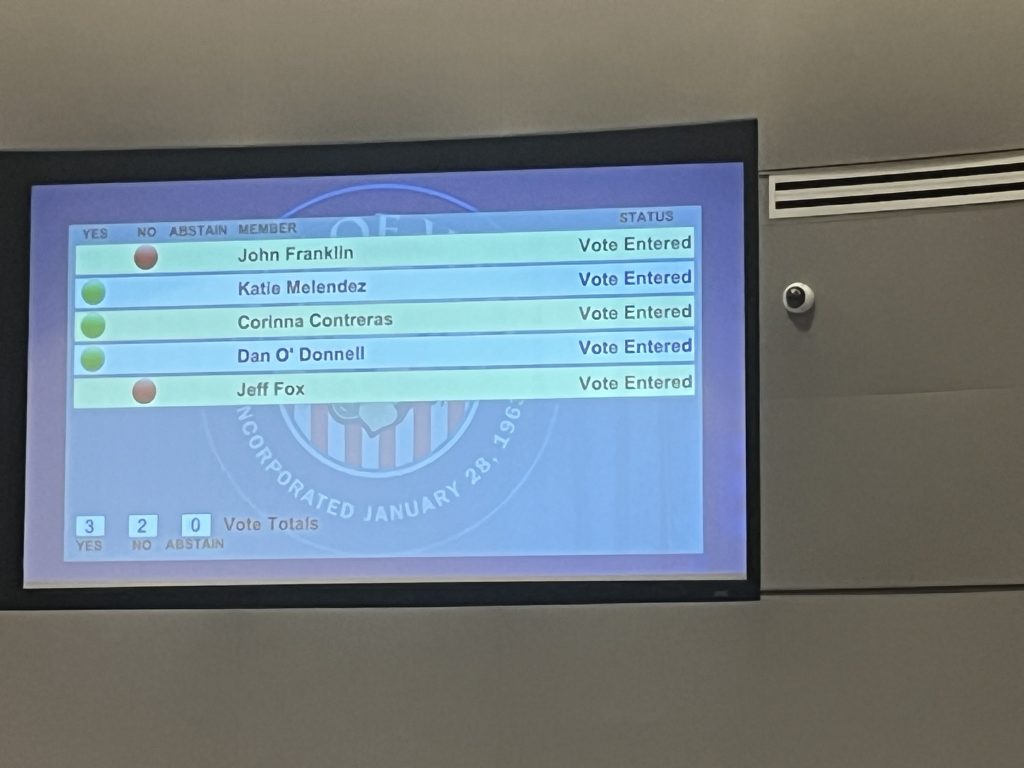
“It was the power of unity,” Teresa said. “After eight hours, people were hugging and crying. We felt the power of the people.”
For Contreras, the turnout itself was the story.
“This is just the start,” she said. “There’s more work ahead, but what matters is that people showed up, that’s how change begins.”
Deacon Maldonado reflected on that same truth
“The change begins with participation,” he said. “If we don’t act, nothing changes. But when we act from faith, God provides the time and courage.”
And Vanessa echoed the same lesson.
“We have to remind people that together, we can,” she said. “It’s about informing, supporting, and never forgetting that while we’re united, we’re strong.”
The Lesson of Vista
The Vista story is a reminder that democracy is not only written in law but lived in community. When fear isolates, organizing restores connection. When politics divides, faith – understood as the practice of hope – can draw people back together.
Through the leadership of SDOP, St. Francis of Assisi, Pastor Rubén, Deacon Maldonado, Teresa Pérez, Vanessa, Luz, and Councilmember Corinna Contreras, a single congregation and a small city demonstrated what civic renewal looks like from the ground up.
In Vista, people didn’t just win a vote. They recovered the truth that belonging itself is sacred and that courage, once organized, can become policy.
“This is what happens,” said Teresa Pérez, “when faith and organizing come together.”
En Español
De Reuniones en Casa al Ayuntamiento
Cómo Vista Transformó el Miedo en Poder
En Vista, California, el miedo comenzaba a extenderse. Las redadas de inmigración separaban a familias, los vecinos se evitaban entre sí y la ansiedad recorría los salones parroquiales. Pero dentro de la Iglesia Católica San Francisco de Asís, los feligreses empezaron a reunirse; no para lamentar lo que estaban perdiendo, sino para escucharse unos a otros y actuar.
Guiados por la organización San Diego Organizing Project (SDOP), una de las nueve federaciones de PICO California, y el clero de San Francisco, esas pequeñas reuniones crecieron hasta convertirse en un movimiento en toda la ciudad. Lo que comenzó como conversaciones silenciosas en salas y bancas de iglesia se transformó en un acto colectivo de valentía que cambiaría la política local y la imaginación cívica de toda una comunidad.
A finales de septiembre, tras casi cinco horas de intenso debate público, el Concejo Municipal de Vista aprobó por un margen reducido una resolución de debido proceso que protege a residentes inmigrantes y latinos de acciones de cumplimiento inconstitucionales. A pesar de la fuerte oposición, incluido el alcalde, los organizadores de SDOP y los líderes de fe de San Francis, movilizaron a más de 300 miembros de la comunidad para llenar la sala del concejo y hacer oír sus voces.
Esta victoria no fue obra de una sola persona. Fue el resultado del poder del pueblo: de la fe, la organización y el liderazgo moral unidos en acción.
Para entender cómo sucedió, PICO California habló con los líderes detrás del movimiento: quienes organizaron, predicaron y acompañaron a sus vecinos durante meses de preparación y una larga noche de valentía. Sus reflexiones revelan lo que es posible cuando la escucha se convierte en confianza, y la confianza en acción por la dignidad y la justicia.
Una Ciudad que Aprende a Caminar Juntos
Fortalecida por el valor de su comunidad, la concejal Corinna Contreras redactó la resolución y se mantuvo firme frente a ataques públicos y campañas de desinformación.
“Estaban llevándose a personas de nuestras calles sin debido proceso,” dijo. “No podía quedarme de brazos cruzados. Mi deber como funcionaria electa es asegurar que se respete la Constitución y se defienda la dignidad humana.”
Contreras, quien representa el Distrito 1 de Vista —de mayoría latina—, trabajó de cerca con SDOP y con la parroquia San Francis de Asís para presentar el tema ante el concejo.
“Esto no es algo que podría haber hecho sola,” explicó. “Sin una comunidad de fe organizada detrás, no habría sido posible.”
La resolución prohíbe que las fuerzas del orden locales cooperen con agencias federales de inmigración en espacios no públicos sin orden judicial, restringe el intercambio de datos con ICE, y exige educación sobre Conozca sus Derechos para los residentes.
“No podemos tener miedo de hacer lo correcto,” afirmó Contreras. “Tenemos que avanzar con valentía, y podemos hacerlo juntos.”
De Reuniones en Casa al Poder Colectivo
Meses antes de la votación, la organizadora principal de SDOP, Teresa Pérez, y líderes parroquiales de San Francis comenzaron a organizar a través de la escucha profunda y la construcción de relaciones.
“Empezamos escuchando,” contó Teresa. “El tema de inmigración salía una y otra vez; la gente tenía miedo. Así que construimos a partir de eso.”
A través de casi treinta reuniones en casa y numerosas conversaciones uno a uno, la confianza creció. Con el apoyo del Padre Rubén y del Diácono Daniel Sanchez y Diácono José Luis Maldonado, la parroquia se convirtió en el centro moral y relacional del esfuerzo organizativo.
“Fuimos ministerio por ministerio, explicando qué significaba esta resolución y cómo podía proteger a sus familias,” recordó Teresa. “La Iglesia le dio a la gente un lugar para reunirse, para hacer preguntas y encontrar valor.”
Estas reuniones no solo sacaron a la luz los temores de la comunidad; construyeron el tejido que une a un pueblo aprendiendo a moverse como uno solo. En semanas de conversaciones en salas y salones parroquiales, vecinos que antes enfrentaban sus ansiedades en soledad comenzaron a ver una historia compartida: lo que sucedía en sus calles no era inevitable, y tenían un camino moral y cívico para cambiarlo.
Cada reunión profundizaba la comprensión del problema, de sus derechos y de los demás. La gente descubrió dónde vivía el poder en su ciudad, qué pasos podían dar juntos y, sobre todo, que sus vecinos estarían a su lado cuando importara. El proceso transformó el miedo en preparación, y la preparación en determinación.
Así que cuando llegó la noche de la votación, esa red silenciosa de relaciones se sostuvo. Más de 300 residentes llenaron la sala, los pasillos y los patios. Eran familias, personas mayores y jóvenes hombro con hombro, seguros de que pertenecían y de que no estarían solos.
“Muchos me dijeron después que tenían miedo,” relató Teresa. “Pero se quedaron. Y cuando la votación pasó, dijeron: vimos el poder del pueblo.”
Líderes de Fe en la Primera Línea
Para el Diácono José Luis Maldonado, la experiencia fue tanto cívica como espiritual.
“Como diácono, una de mis prioridades es la justicia social,” dijo. “Sentí que era mi obligación, no solo como clérigo, sino como residente, estar con mi comunidad.”
Describió la noche como una de tensión, transformación y gracia.
“Al principio dolía escuchar tanta oposición,” recordó. “Pero cuando la gente empezó a compartir sus historias, los corazones comenzaron a cambiar. Al final, cuando se aprobó la votación, hubo alegría, lágrimas, abrazos, alivio. Demostró que la fe y la participación pueden mover montañas.”
Organización desde la Base
Entre las nuevas líderes que ayudaron a lograr esa participación estuvo Vanessa, voluntaria de SDOP y miembro del Ministerio de Justicia Social en San Francis. Inspirada por el ejemplo de su madre en la organización parroquial, Vanessa ayudó a difundir el mensaje, realizar sesiones de escucha y acompañar a feligreses que tenían miedo de asistir.
“Cuando empezamos las sesiones de escucha, la gente compartía sus miedos,” dijo. “Les decíamos: quizá no podamos cambiar lo que pasa a nivel nacional, pero sí podemos hacer algo aquí, localmente, juntos.”
Recordó cómo el Padre Rubén permitió anunciar las reuniones en las misas en español, animando a miles de familias parroquiales a informarse, hacer preguntas y participar.
“El Padre siempre apoya a la comunidad latina,” comentó Vanessa. “La gente se sentía más segura sabiendo que la Iglesia estaba con ellos.”
Muchos de los asistentes nunca habían estado en el ayuntamiento. Vanessa los tranquilizó, recordándoles que pertenecían allí.
“Algunos tenían miedo,” contó. “Preguntaban: ‘¿Puedo ir si no soy ciudadano?’ Y yo les decía: ‘Sí, tú vives aquí, esta es tu comunidad, tienes derecho a estar presente.’”
Ver a cientos de familias reunidas fue un momento decisivo para ella.
“Cuando vi a tanta gente de pie, sin sillas disponibles, me dije: sí se puede. Mientras estemos juntos, somos fuertes.”
Un Testimonio del Liderazgo Comunitario
Esa noche también estuvo Luz, empleada gubernamental jubilada, miembro de la junta de SDOP y parte del Ministerio de Justicia Social de San Francis.
“Cuando hacemos el llamado, nunca sabemos quién va a venir,” dijo Luz. “Pero cuando es importante, la gente aparece y esa noche lo hicieron. Eso me da esperanza.”
Recordó estar sentada junto a residentes que se oponían a la resolución. Después de hablar, el ambiente cambió.
“No me conocían, solo tenían una imagen de quién creían que éramos,” explicó. “Una vez que escucharon mi historia, el ambiente se transformó. Eso es lo que pasa cuando nos escuchamos unos a otros.”
El Poder del Pueblo y la Esperanza
Cuando finalmente se aprobó la resolución, poco después de la una de la mañana, la sala del concejo estalló en celebración. Las familias se abrazaron. Los niños, dormidos en los hombros de sus padres, despertaron entre aplausos y lágrimas.
“Fue el poder de la unidad,” dijo Teresa. “Después de ocho horas, la gente se abrazaba y lloraba. Sentimos el poder del pueblo.”
Para Contreras, la asistencia misma fue la historia.
“Esto es solo el comienzo,” afirmó. “Queda mucho trabajo por delante, pero lo que importa es que la gente se presentó, así es como empieza el cambio.”
El Diácono Maldonado reflexionó sobre la misma verdad:
“El cambio empieza con la participación,” dijo. “Si no actuamos, nada cambia. Pero cuando actuamos desde la fe, Dios nos da el tiempo y el valor.”
Y Vanessa compartió la misma lección.
“Tenemos que recordarle a la gente que juntos sí podemos,” dijo. “Se trata de informar, apoyar y nunca olvidar que, mientras estemos unidos, somos fuertes.”
La Lección de Vista
La historia de Vista nos recuerda que la democracia no solo se escribe en las leyes, sino que se vive en comunidad. Cuando el miedo aísla, la organización reconecta. Cuando la política divide, la fe, entendida como la práctica de la esperanza, puede volver a unirnos.
A través del liderazgo de SDOP, San Francis de Asís, el Padre Rubén, el Diácono Maldonado, Teresa Pérez, Vanessa, Luz y la concejal Corinna Contreras, una sola congregación y una pequeña ciudad demostraron cómo se ve la renovación cívica desde la base.
En Vista, la gente no solo ganó una votación. Recuperó la verdad de que el sentido de pertenencia es sagrado y que la valentía, cuando se organiza, puede convertirse en política pública.
“Esto es lo que sucede,” dijo Teresa Pérez, “cuando la fe y la organización se unen.”
